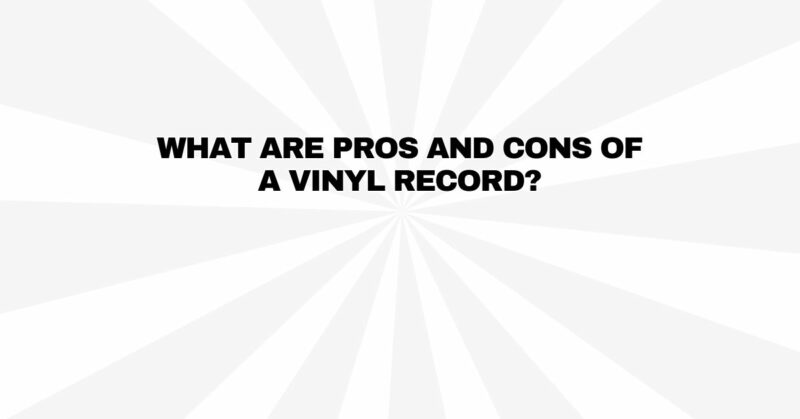In an era dominated by digital music streaming and downloads, vinyl records have staged a remarkable resurgence. These analog discs, once considered a relic of the past, have regained popularity among audiophiles and music enthusiasts. However, like any audio format, vinyl records come with their own set of advantages and disadvantages. In this article, we will explore the pros and cons of vinyl records to better understand their enduring appeal and limitations.
The Pros of Vinyl Records:
- Analog Warmth and Character:
- Vinyl records are celebrated for their analog warmth and character. They have a unique sonic quality characterized by a warmth and richness that many listeners find appealing. This is due in part to the continuous waveform representation of analog recordings.
- Tactile Engagement:
- Playing a vinyl record is a tactile and hands-on experience. Selecting a record, carefully placing the needle on the groove, and watching the disc spin create a unique connection to the music. This physical interaction is absent from digital formats.
- Album Art and Packaging:
- Vinyl records often feature large, visually striking album art and packaging. The size of the album cover allows for intricate artwork, lyrics, and additional information that digital formats cannot provide. Collectors and enthusiasts appreciate the tangible nature of vinyl records and the artistic value of album covers.
- Collectibility and Rarity:
- Vinyl records have become collectible items. Enthusiasts enjoy the thrill of hunting for rare and vintage releases. Limited editions, colored vinyl, and special pressings add to the allure of vinyl collecting.
- Wide Dynamic Range:
- Vinyl records often have a wide dynamic range, allowing them to capture and reproduce subtle nuances in music, particularly in acoustic instruments and quiet passages. This dynamic range can be particularly appreciated for genres that emphasize live instrumentation and intricate musical arrangements.
- Imperfections as Part of the Charm:
- Vinyl’s imperfections, such as surface noise, pops, and clicks, are considered part of its charm by many enthusiasts. These analog quirks contribute to a more authentic and engaging listening experience. Some listeners appreciate the “human” element of vinyl records, as imperfections remind them that the music was created and reproduced by physical means.
The Cons of Vinyl Records:
- Limited Playback Convenience:
- Vinyl records require specialized playback equipment, including a turntable and a phono preamplifier. This equipment can be expensive and requires regular maintenance. In contrast, digital formats can be played on a wide range of devices, from smartphones to computers.
- Fragility and Vulnerability:
- Vinyl records are susceptible to physical damage, including scratches, warping, and groove wear. Mishandling or improper storage can lead to irreversible damage, affecting the playback quality.
- Limited Portability:
- Vinyl records are not a portable format. Carrying a collection of vinyl records is impractical due to their size and weight. Digital formats, such as MP3s or streaming, offer unparalleled portability.
- Limited Storage Space:
- Vinyl records require significant physical storage space. A sizable collection can take up an entire room, making them less practical for those with limited space.
- Imperfections as Drawbacks:
- While some listeners appreciate vinyl’s imperfections as part of the charm, others see them as drawbacks. Surface noise, pops, and clicks can distract from the music and degrade the listening experience, especially when playing well-worn records.
- Limited Availability and Cost:
- Some albums are difficult to find on vinyl, and collectors may need to pay a premium for rare or out-of-print records. Additionally, new vinyl releases can be more expensive than their digital counterparts.
Conclusion:
Vinyl records possess a unique charm and audio quality that continue to captivate audiophiles and collectors worldwide. The analog warmth, tactile engagement, and collectibility of vinyl make it a cherished format for many music enthusiasts. However, vinyl records also come with drawbacks, such as limited playback convenience, vulnerability to damage, and the need for specialized equipment.
Ultimately, whether vinyl records are right for you depends on your personal preferences and priorities as a music listener. While digital formats offer convenience and portability, vinyl records offer a tangible connection to music history and a unique listening experience that transcends the mere reproduction of sound. Whether you are drawn to the analog warmth of vinyl or prefer the convenience of digital, both formats have their place in the world of music, providing diverse options to suit different tastes and lifestyles.


